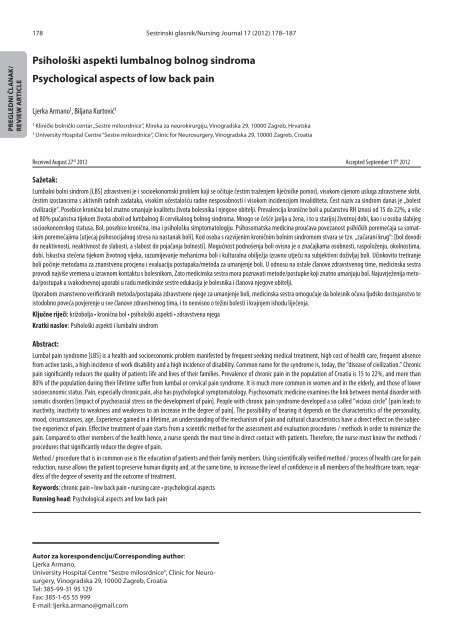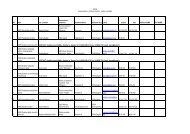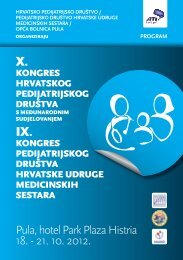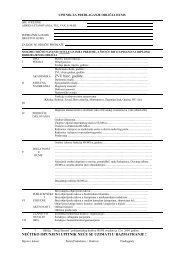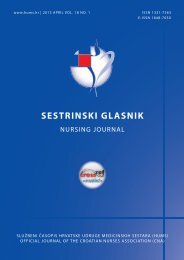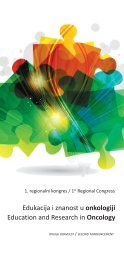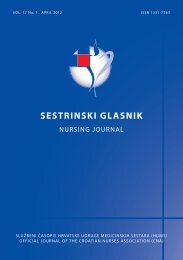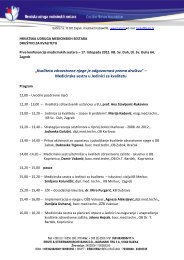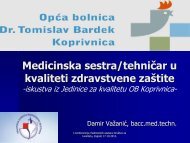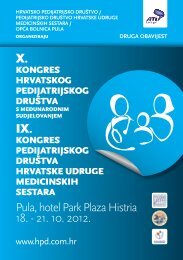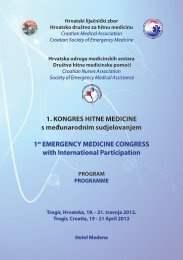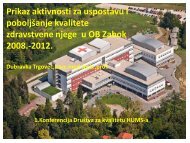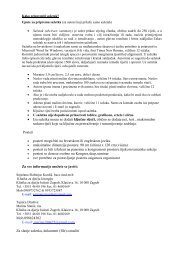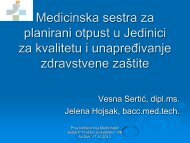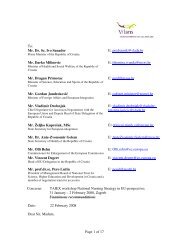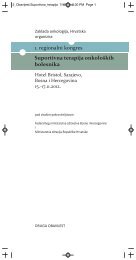Sestrinski glasnik br. 3 / 2012. - Hrvatska udruga medicinskih sestara
Sestrinski glasnik br. 3 / 2012. - Hrvatska udruga medicinskih sestara
Sestrinski glasnik br. 3 / 2012. - Hrvatska udruga medicinskih sestara
Create successful ePaper yourself
Turn your PDF publications into a flip-book with our unique Google optimized e-Paper software.
PREGLEDNI ČLANAK/<<strong>br</strong> />
REVIEW ARTICLE<<strong>br</strong> />
178 <strong>Sestrinski</strong> <strong>glasnik</strong>/Nursing Journal 17 (2012) 178–187<<strong>br</strong> />
Psihološki aspekti lumbalnog bolnog sindroma<<strong>br</strong> />
Psychological aspects of low back pain<<strong>br</strong> />
Ljerka Armano 1 , Biljana Kurtović 1<<strong>br</strong> />
1 Klinički bolnički centar „Sestre milosrdnice“, Klinika za neurokirurgiju, Vinogradska 29, 10000 Zagreb, <strong>Hrvatska</strong><<strong>br</strong> />
1 University Hospital Centre “Sestre milosrdnice“, Clinic for Neurosurgery, Vinogradska 29, 10000 Zagreb, Croatia<<strong>br</strong> />
Received August 27 st 2012 Accepted September 11 th 2012<<strong>br</strong> />
Sažetak:<<strong>br</strong> />
Lumbalni bolni sindrom [LBS] zdravstveni je i socioekonomski problem koji se očituje čestim traženjem liječničke pomoći, visokom cijenom usluga zdravstvene skrbi,<<strong>br</strong> />
čestim izostancima s aktivnih radnih zadataka, visokim učestalošću radne nesposobnosti i visokom incidencijom invaliditeta. Čest naziv za sindrom danas je „bolest<<strong>br</strong> />
civilizacije“. Posebice kronična bol znatno smanjuje kvalitetu života bolesnika i njegove obitelji. Prevalencija kronične boli u pučanstvu RH iznosi od 15 do 22%, a više<<strong>br</strong> />
od 80% pučanstva tijekom života oboli od lumbalnog ili cervikalnog bolnog sindroma. Mnogo se češće javlja u žena, i to u starijoj životnoj dobi, kao i u osoba slabijeg<<strong>br</strong> />
socioekonomskog statusa. Bol, posebice kronična, ima i psihološku simptomatologiju. Psihosomatska medicina proučava povezanost psihičkih poremećaja sa somatskim<<strong>br</strong> />
poremećajima [utjecaj psihosocijalnog stresa na nastanak boli]. Kod osoba s razvijenim kroničnim bolnim sindromom stvara se tzv. „začarani krug“: [bol dovodi<<strong>br</strong> />
do neaktivnosti, neaktivnost do slabosti, a slabost do pojačanja bolnosti]. Mogućnost podnošenja boli ovisna je o značajkama osobnosti, raspoloženju, okolnostima,<<strong>br</strong> />
dobi. Iskustva stečena tijekom životnog vijeka, razumijevanje mehanizma boli i kulturalna obilježja izravno utječu na subjektivni doživljaj boli. Učinkovito tretiranje<<strong>br</strong> />
boli počinje metodama za znanstvenu procjenu i evaluaciju postupaka/metoda za umanjenje boli. U odnosu na ostale članove zdravstvenog time, medicinska sestra<<strong>br</strong> />
provodi najviše vremena u izravnom kontaktu s bolesnikom, Zato medicinska sestra mora poznavati metode/postupke koji znatno umanjuju bol. Najuvrježenija metoda/postupak<<strong>br</strong> />
u svakodnevnoj uporabi u radu medicinske sestre edukacija je bolesnika i članova njegove obitelji.<<strong>br</strong> />
Uporabom znanstveno verifi ciranih metoda/postupaka zdravstvene njege za umanjenje boli, medicinska sestra omogućuje da bolesnik očuva ljudsko dostojanstvo te<<strong>br</strong> />
istodobno poveća povjerenje u sve članove zdravstvenog tima, i to neovisno o težini bolesti i krajnjem ishodu liječenja.<<strong>br</strong> />
Ključne riječi: križobolja • kronična bol • psihološki aspekti • zdravstvena njega<<strong>br</strong> />
Kratki naslov: Psihološki aspekti i lumbalni sindrom<<strong>br</strong> />
Abstract:<<strong>br</strong> />
Lumbal pain syndrome [LBS] is a health and socioeconomic problem manifested by frequent seeking medical treatment, high cost of health care, frequent absence<<strong>br</strong> />
from active tasks, a high incidence of work disability and a high incidence of disability. Common name for the syndrome is, today, the “disease of civilization.” Chronic<<strong>br</strong> />
pain signifi cantly reduces the quality of patients life and lives of their families. Prevalence of chronic pain in the population of Croatia is 15 to 22%, and more than<<strong>br</strong> />
80% of the population during their lifetime suff er from lumbal or cervical pain syndrome. It is much more common in women and in the elderly, and those of lower<<strong>br</strong> />
socioeconomic status. Pain, especially chronic pain, also has psychological symptomatology. Psychosomatic medicine examines the link between mental disorder with<<strong>br</strong> />
somatic disorders [impact of psychosocial stress on the development of pain]. People with chronic pain syndrome developed a so called “vicious circle” [pain leads to<<strong>br</strong> />
inactivity, inactivity to weakness and weakness to an increase in the degree of pain]. The possibility of bearing it depends on the characteristics of the personality,<<strong>br</strong> />
mood, circumstances, age. Experience gained in a lifetime, an understanding of the mechanism of pain and cultural characteristics have a direct eff ect on the subjective<<strong>br</strong> />
experience of pain. Eff ective treatment of pain starts from a scientifi c method for the assessment and evaluation procedures / methods in order to minimize the<<strong>br</strong> />
pain. Compared to other members of the health hence, a nurse spends the most time in direct contact with patients. Therefore, the nurse must know the methods /<<strong>br</strong> />
procedures that signifi cantly reduce the degree of pain.<<strong>br</strong> />
Method / procedure that is in common use is the education of patients and their family members. Using scientifi cally verifi ed method / process of health care for pain<<strong>br</strong> />
reduction, nurse allows the patient to preserve human dignity and, at the same time, to increase the level of confi dence in all members of the healthcare team, regardless<<strong>br</strong> />
of the degree of severity and the outcome of treatment.<<strong>br</strong> />
Keywords: chronic pain • low back pain • nursing care • psychological aspects<<strong>br</strong> />
Running head: Psychological aspects and low back pain<<strong>br</strong> />
Au tor za ko res pon den ci ju/Corresponding aut hor:<<strong>br</strong> />
Ljerka Armano,<<strong>br</strong> />
University Hospital Centre “Sestre milosrdnice“, Clinic for Neurosurgery,<<strong>br</strong> />
Vinogradska 29, 10000 Zagreb, Croatia<<strong>br</strong> />
Tel: 385-99-31 95 129<<strong>br</strong> />
Fax: 385-1-65 55 999<<strong>br</strong> />
E-mail: ljerka.armano@gmail.com


